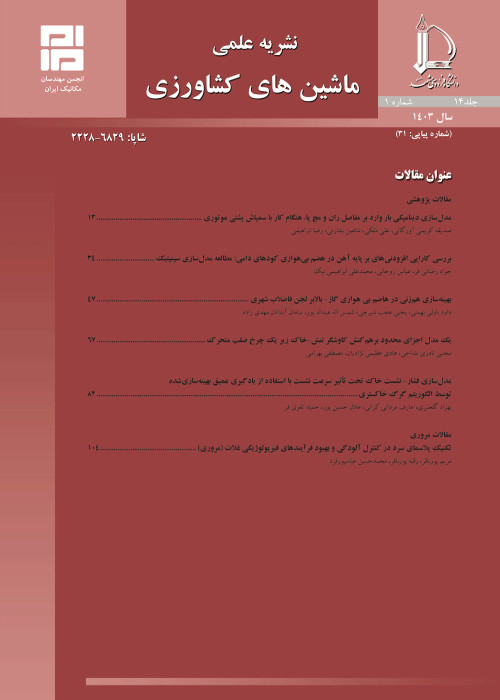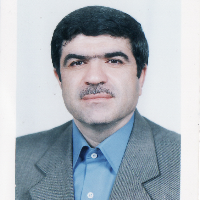Development and Evaluation of an Electronic Nose System Based on MOS Sensors to Detect and to Distinguish Lemon Essential Oils
Author(s):
Article Type:
Research/Original Article (دارای رتبه معتبر)
Abstract:
Introduction
Essences or essential oils are aromatic compounds that are found in different organs of the plants. Essences can be classified into three groups of natural, synthetic and natural like. Most of the methods that are used to detect and to distinguish essential oils are based on chromatographic methods. However, these analytical methods are time consuming and require expert operators to work with required devices. Moreover, it is necessary to prepare the samples. An electronic nose is known as a tool for mimicking the sense of smell. This tool usually consists of an array of sensors which are used to identify and to isolate a variety of complex odors at a low cost. Since there has been no research on the usage of an electronic nose system for detection and separation of essential oils, the purpose of this study is to develop and to evaluate an electronic nose system for identification and classification of various types of commercial lemon essential oils (synthetic types).
Materials and Methods
The proposed system consists of a sensor chamber, a sample chamber, an array of MOS sensors, electro valves, a pump, a data acquisition cart and, a processor. Essential oils used in this study includes eight types of synthetic commercial lemon essential oils that were prepared by ((Avishan Khane Tabiat Sabz)) Company located in chemistry and chemical engineering research center of Iran. One gram sample of each essential oil was prepared to be placed in the sample chamber. Each experiment was carried out in 9 replicates and in three stages of 1- Baseline correction (250 s) 2- Sample smell injection (400 s) and 3- Sensors chamber cleaning (200 s). Data received from the sensors signals were initially preprocessed and normalized and then three methods of principal component analyses (PCA), linear discriminant analyses (LDA) and artificial neural network (ANN) were used to process the data. Both PCA and LDA methods were run using the Unscramble x10.4 software and the artificial neural network was used with the help of NeuroSolution 5 software. In ANN, the classification was carried out using a multilayer perceptron (MLP) and Leave-one-out technique. Leave-one-out is an acceptable method for evaluating the performance of the classification algorithms when the number of samples is low.
Results and Discussion
In order to analyze the data obtained from the sensor array, first, the principal components analysis (PCA) method was used. In this method, the first two principal components of PC 1 and PC 2 totally covered 99% of the data variance. Another plot called as loading plot was used to determine the effects of each sensor responses in pattern recognition analyzes. According to this plot, all sensors had high loading coefficients. In case of distinguishing the lemon essential oils, the results of the linear discriminant analysis (LDA) method showed that this method can distinguish eight types of lemon essential oils with an accuracy of %98. The artificial neural network (ANN) also separated the essential oils with the accuracy of the above %91.
Conclusions
An Electronic nose system based on semiconductor metal oxide sensors is a powerful tool that can be used as a substitute for traditional methods. In general, this study showed that the electronic nose system based on MOS sensors has the ability to detect and to distinguish commercial lemon essential oils. Considering the wide ranges and economical nature of the essential oils, it is suggested that applications of the electronic nose can be more expanded in the subject of the essential oils of different products.Keywords:
ANN , Electronic nose , Essential oil , LDA , PCA
Language:
Persian
Published:
Journal of Agricultural Machinery, Volume:9 Issue: 2, 2019
Pages:
253 to 263
magiran.com/p1977660
دانلود و مطالعه متن این مقاله با یکی از روشهای زیر امکان پذیر است:
اشتراک شخصی
با عضویت و پرداخت آنلاین حق اشتراک یکساله به مبلغ 1,390,000ريال میتوانید 70 عنوان مطلب دانلود کنید!
اشتراک سازمانی
به کتابخانه دانشگاه یا محل کار خود پیشنهاد کنید تا اشتراک سازمانی این پایگاه را برای دسترسی نامحدود همه کاربران به متن مطالب تهیه نمایند!
توجه!
- حق عضویت دریافتی صرف حمایت از نشریات عضو و نگهداری، تکمیل و توسعه مگیران میشود.
- پرداخت حق اشتراک و دانلود مقالات اجازه بازنشر آن در سایر رسانههای چاپی و دیجیتال را به کاربر نمیدهد.
In order to view content subscription is required
Personal subscription
Subscribe magiran.com for 70 € euros via PayPal and download 70 articles during a year.
Organization subscription
Please contact us to subscribe your university or library for unlimited access!



